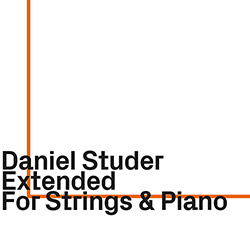
Here is one installment in a new series supervised by the ever-industrious Werner X. Uehlinger, who has brought us such wonderful and diverse music for more than four decades through the Hat Hut label. This February 2018 performance finds double bassist Daniel Studer in the company of violinist Harald Kimmig, violist Frantz Loriot, cellist Alfred Zimmerlin and pianist Philip Zoubek. The fact that the music is excellently recorded and produced is no surprise to those familiar with the Hat team's consistently wonderful work. The rest, meaning the music, is not nearly so clear-cut, nor should it be. Brian Morton's historically and socio-politically inclusive liner notes provide an excellent backdrop for the challenging and ultimately uncategorizable sounds produced by a group about whom the descriptor "like-minded" would be both compliment and slight.
The initial gesture of "Comprimere" tells the tale, or at least a large portion of it, in stunning microcosm. A miniscule utterance, bordering the realm of anacrusis to a form completely unwilling to follow the leader, is obliterated by the arm and hammer of staccato virility. The ensuing silences, nearly unbearable in intensity, and the repetition of those stark opening salvos inculcate the listener into a form replete with contrast. Those starkly delineated and slowly disassembled signposts, there and gone in a flash, are often connected by music whose delicacy is as beguiling as their timbral makeup is intriguing. As drops of water meet rivers, oceans and clouds, the signposts dissolve into their components, which are then subsumed into the overall texture in a stunning feat of listening and non-listening. Their ultimate reassembly, amidst drone and pause, is equally astonishing. The piece is a long-form of short forms, wheels within wheels and sparks within a dancing and morphing flame.
There is something biting about this music, something not so much confrontational as directive, demanding attention, guaranteed, as The Residents might have it, "to shake you up." The initial freneticism of the snarkily exquisite Motus" howls into action, but listen just below the roiling surface to hear a piano melody wrought from shimmering pointillisms and registral interplay. Even the first of the bagatelles, grunting and groaning along in unified travail, comprises articulations and resolutions of infinite variety, subtle slides and smears approximating the ambiguous felicities of human speech, and there's the rub. While Morton's notes lay out the broad parameters in wonderful context, the music's obvious allegiance to structure is not illuminated, most likely by design. These are compositions, whatever their improvised components — my guess is timbral — might be, and it would have been intriguing, for this listener, to have a few notes from the composer of such intricate and often expansive forms. That said, the sound is the thing, and the music's large and small-scale gestures are executed by an absolutely committed and staggeringly virtuosic group of musicians. Who is who is often relegated to the realm of mystery as orchestral unity takes over. The quintet, under Studer's firm and obvious direction, offers a journey through unsettling but often almost familiar realms that anyone strong of constitution will want to undertake again and again.
Comments and Feedback:



More Recent Reviews, Articles, and Interviews @ The Squid's Ear...


|

